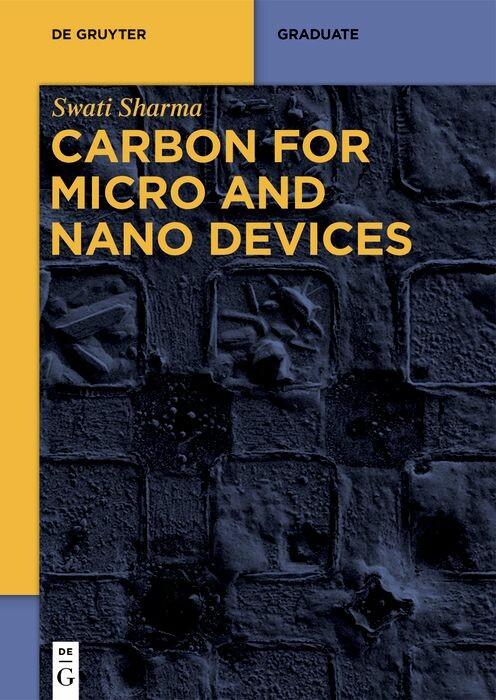
Sofort lieferbar (Download)
Micro and nano devices are an integral part of modern technology. To address the requirements of the state-of-the-art technology, topics are selected from both chip-based and flexible electronics. A wide range of carbon materials including graphene, carbon nanotube, glass-like carbon, porous carbon, carbon black, graphite, carbon nanofiber, laser-patterned carbon and heteroatom containing carbon are covered. This goal is to elucidate fundamental carbon material science along with compatible micro- and nanofabrication techniques. Real-life example of sensors, energy storage and generation devices, MEMS, NEMS and implantable bioelectronics enable visualization of the outcome of described processes.
Students will also benefit from the attractive aspects of carbon science explained in simple terms. Hybridization, allotrope classification and microstructural models are presented with a whole new outlook. Discussions on less-studied, hypothetical and undiscovered carbon forms render the contents futuristic and highly appealing.
Swati Sharma is an Assistant Professor in the School of Mechanical and Materials Engineering at the Indian Institute of Technology Mandi, India. Prior to this, she worked as a Scientist at the Karlsruhe Institute of Technology and the University of Freiburg in Germany. She obtained her Master's and Ph. D. degrees in materials engineering from the University of California Irvine, CA, USA. Part of her work on carbon fiber and glass-like carbon was carried out at the Ulsan National Institute of Science & Technology, South Korea, and at the Indian Institute of Technology Kanpur. Swati holds a Bachelor's degree in chemical engineering from the Birla Institute of Technology and Science, Pilani, India. In addition to academic research, she gained industrial R&D experience while working as a Scientist and Project Manager in Ranbaxy Research Laboratories, India.
Her current research is focused on a wide range of carbon materials and associated manufacturing techniques for chip-based and flexible device applications. She particularly specializes in understanding the mechanism of carbon formation, and analyzing the microstructure of polymeric carbons. In a 2022 publication in the journal Carbon, she proposed a new microstructural model for non-graphitizing carbons confirming the presence with a quantification of fullerenes in such materials. Her recent interest is laser-patterned carbon, which is a specifically designed carbon material for modern flexible electronics. In addition, she is working on N- and S-containing carbons, waste-derived carbon and carbon fibers. The outcome of her research has been published in esteemed journals, books and patents. The devices fabricated in her lab are used in supercapacitors, batteries, fuel cells and sensors. Some of her notable publications are as follows:
[1] S. Sharma, S. Zorzi, V. Cristiglio, R. Schweins, C. Mondelli, Carbon 2022, 189, 362.
[2] M. Devi, H. Wang, S. Moon, S. Sharma, V. Strauss, Advanced Materials 2023, 2211054.
[3] M. Devi, B. Raut, S. Sharma, Part & Part Syst Charact 2023, 2300018.
[4] M. Devi, S. Upadhyay, R. A. Mir, N. Kumar, S. Sharma, Journal of Energy Storage 2023, 73, 109067.
[5] S. Sharma, C. N. Shyam Kumar, J. G. Korvink, C. Kübel, Sci Rep 2018, 8, 16282.
[6] M. Vomero, C. Gueli, E. Zucchini, L. Fadiga, J. B. Erhardt, S. Sharma, T. Stieglitz, Advanced Materials Technologies 2020, 5, 1900713.
[7] E. Fuhrer, A. Bäcker, S. Kraft, F. J. Gruhl, M. Kirsch, N. MacKinnon, J. G. Korvink, S. Sharma, Advanced Healthcare Materials 2018, 7, 1700915.
[8] E. R. Mamleyev, S. Heissler, A. Nefedov, P. G. Weidler, N. Nordin, V. V. Kudryashov, K. Länge, N. MacKinnon, S. Sharma, npj Flexible Electronics 2019, 3, 2.
[9] S. Sharma, A.
Mehr aus dieser Reihe
Produktdetails
Erscheinungsdatum
18. März 2024
Sprache
englisch
Seitenanzahl
254
Dateigröße
16,93 MB
Reihe
De Gruyter Textbook
Autor/Autorin
Swati Sharma
Verlag/Hersteller
Kopierschutz
mit Wasserzeichen versehen
Family Sharing
Ja
Produktart
EBOOK
Dateiformat
PDF
ISBN
9783110620634
Entdecken Sie mehr
Bewertungen
0 Bewertungen
Es wurden noch keine Bewertungen abgegeben. Schreiben Sie die erste Bewertung zu "Carbon for Micro and Nano Devices" und helfen Sie damit anderen bei der Kaufentscheidung.
































